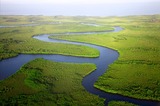
This lesson presents an overview of the careers available within Environmental Health.
- Subject:
- Agriculture
- Material Type:
- Homework/Assignment
- Lecture Notes
- Lesson Plan
- Author:
- Owl Nest Manager
- Date Added:
- 04/28/2022

This lesson presents an overview of the careers available within Environmental Health.

This course explores the complex interrelationships among humans and natural environments, focusing on non-western parts of the world in addition to Europe and the United States. It uses environmental conflict to draw attention to competing understandings and uses of “nature” as well as the local, national and transnational power relationships in which environmental interactions are embedded. In addition to utilizing a range of theoretical perspectives, this subject draws upon a series of ethnographic case studies of environmental conflicts in various parts of the world.
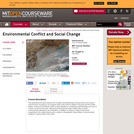
This course explores the complex interrelationships among humans and natural environments, focusing on non-western parts of the world in addition to Europe and the United States. It uses environmental conflict to draw attention to competing understandings and uses of “nature” as well as the local, national and transnational power relationships in which environmental interactions are embedded. In addition to utilizing a range of theoretical perspectives, this subject draws upon a series of ethnographic case studies of environmental conflicts in various parts of the world.
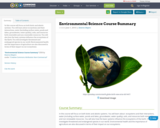
In this course will focus on both biotic and abiotic systems. You will learn about ecosystems and their interactions, water (including surface water, ponds and lakes, groundwater, water quality), soils, and resources both renewable and non-renewable resources. You will also how the basic systems influence the ecosystems of the Earth. You will investigate threatened and endangered species in our world. Environmental health and the importance of agriculture are also discussed in terms of their impact on our ecosystems.

This class examines the built, psychosocial, economic, and natural environment factors that affect health behaviors and outcomes. Students will be introduced to tools designed to integrate public health considerations into policy making and planning, and will be given hands-on training on the application of Health Impact Assessment (HIA) methodology. This class is designed to prepare graduate students from planning and policy fields to interface with public health organizations, agencies, or advocacy groups in professional contexts.
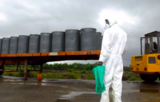
This session will expand the student´s knowledge about human health and quality of life in the context of global and local ecology. Examples will be provided on how environmental management and development influence human health. The session provide an overview of the disease burden attributable to the environment, and much of this burden is placed across different geographical regions of the world. Examples will be presented on the impacts of poor quality water, insufficient access to water, lack of appropriate sanitation and poor personal hygiene. Other examples of environmental health factors included relate to reduced forest cover, unsustainable agricultural production systems, climate change, and poor management of natural resources that significantly influence livelihood, food security and migration patterns.

Our planet is precious. Connecting to our world and becoming aware of our surroundings and ways we can keep Earth beautiful can be empowering to students and adults alike! Our goal with this project is to encourage and empower students to reduce waste in our classrooms, our school, our community and beyond!

Part two in the series Paradise under Pressure/ Paradis under pres: https://paradis-under-pres.simplecast.com/
There is good reason to invest in tourism in Zanzibar. In 2019, it was expected that over half a million tourists would visit the island, which is only half the size of Funen island in Denmark. Tourists bring in money and growth, but research shows that, for example, Zanzibarians only have 11% of managerial jobs in restaurants and only 20% of tourism revenue goes to the local community, while 53% disappear from the island.
Danish:
Der er god grund til at investere i turismen på Zanzibar. I 2019 forventede man, at over en halv million turister ville besøge øen, som kun er halvt så stor som Fyn. Turisterne bringer penge og vækst, men forskningen viser, at zanzibarianere for eksempel kun har 11% af lederjobs på restauranter og kun 20% af indtægterne fra turismen går til lokalsamfundet, imens hele 53% forsvinder væk fra øen.

Includes a wide variety of fun activities designed to help children learn about the impact of the environment on human health, the NIEHS mission, and possible careers in health, medicine, science, mathematics, and the environment. (National Institute of Environmental Health Sciences)
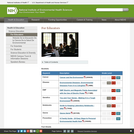
Find a variety of educational materials, many of which are standards-based, to exposure your students to environmental health concepts. (National Institute of Environmental Health Sciences)
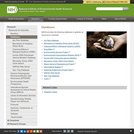
Today the NIEHS is expanding and accelerating its contributions to scientific knowledge of human health and the environment, and to the health and well-being of people everywhere. It provides the following databases & galleries as resources to scientists: The Alu Pairs Database, The Biomarkers of Oxidative Stress Study (BOSS), Chemical Effects in Biological Systems(CEBS), The Drug Matrix, The Environmental Genome Project, The Environmental Polymorphisms Registry, The Human DNA Polymerase Gamma Mutation, The Microarray Center cDNA Clone Search, Mouse Genome Resequencing Project, The Nanomaterial Registry, The Roadmap Epigenomics Project Data, The SNPinfo Web Server and the Spin Trap Database.

Part one in the series Paradise under Pressure/ Paradis under pres: https://paradis-under-pres.simplecast.com/
Plastic bottles are impossible to avoid when travelling for vacation to southern countries. In Zanzibar, thousands of plastic bottles are sailed in from the mainland every day. They float as waste everywhere on beaches, streets, and in between bushes, trees and tall grass.
In this episode, we will meet Aziza Biubwa of the State University of Zanzibar, a researcher in waste management, Justin Madho, who works for the waste company Zanrec and Sjani Müggenburg, director of Ozti East Africa - a company that has made furniture plastic screw cap.
Danish:
Plastikflasker er umulige at undgå, når du holder ferie i syden. På Zanzibar bliver tusindvis af plastikflasker hver dag sejlet ind fra fastlandet, men som affald flyder de overalt på strande, gader, og imellem buske, træer og højt græs.
I denne episode skal vi møde Aziza Biubwa fra State University of Zanzibar, som forsker i affaldshåndtering, Justin Madho, som arbejder for affaldsfirmaet Zanrec og Sjani Müggenburg, som er direktør for Ozti East Africa – et firma der har fundet ud af at lave møbler af plastikskruelåg.
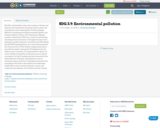
By 2030, substantially reduce the number of deaths and illnesses from hazardous chemicals and air, water and soil pollution and contamination
Professor Magne Bråtveit, Occupational and Environmental Health, and Professor Bente E. Moen, CIH, University of Bergen
London’s lethal fog of 1952 was a result of coal burning and temperature inversions. It brought the issue of air pollution to public attention. It resulted in 12 000 deaths and 150 000 hospitalisations. As a result, Britain passed the Clean Air Act of 1956. Health complications due to air pollution make it among the 10 leading factors for death in most countries. It is responsible for about 1 in every 9 deaths around the world every year. It is listed as number 6 in the 10 leading risk factors posted by the Global Burden of Disease.
Air pollutions is due to chemicals, gases, particles or biological material in the atmosphere that lead to discomfort and undesirable health effects such as airway diseases, cancer, and cardiovascular diseases, all of which can lead to death.

This course explores the application of environmental and economic development planning, policy and management approaches to urban neighborhood community development. Through an applied service learning approach, the course requires students to prepare a sustainable development plan for a community-based non-profit organization. Through this client-based planning project, students will have the opportunity to test how sustainable development concepts and different economic and environmental planning approaches can be applied to advance specific community goals within the constraints of specific neighborhoods and community organizations.

This is an Environmental Humanities podcast centred post secondary curriculum on environmental health and environmental justice. Scholarly Personal Narrative methodology was used, meaning the author's own story is included in this story based content. Each module - which can be stand alone for use in a variety of disciplines - or as a sequence - features a unique podcast and essay, along with Instructors' Guides, Learning Outcomes, Key Concepts, Curated Materials (Explorations) and Quizzes.

This course examines the policy and planning for the provision of water supply and sanitation services in developing countries. It reviews available technologies, but emphasizes the planning and policy process, including economic, social, environmental, and health issues. The course incorporates considerations of financing, pricing, institutional structure, consumer demand, and community participation in the planning process. And it evaluates policies and projects in case studies from Asia, Africa, Latin America, and Central and Eastern Europe.

Part three in the series Paradise under Pressure/ Paradis under pres: https://paradis-under-pres.simplecast.com/
According to the international hotels in Zanzibar, it is difficult to find qualified local workers who speak good enough English and have the right experience and education. But is it, in fact, an excuse used by tourism industry leaders not to live up to their responsibilities?
Danish:
Ifølge de internationale hoteller på Zanzibar, så er det svært at finde kvalificeret lokale arbejdere, som taler godt nok engelsk og har den rette erfaring og uddannelse. Men er det i virkeligheden en undskyldning som turistbranchens ledere bruger, for ikke at leve op til deres ansvar?